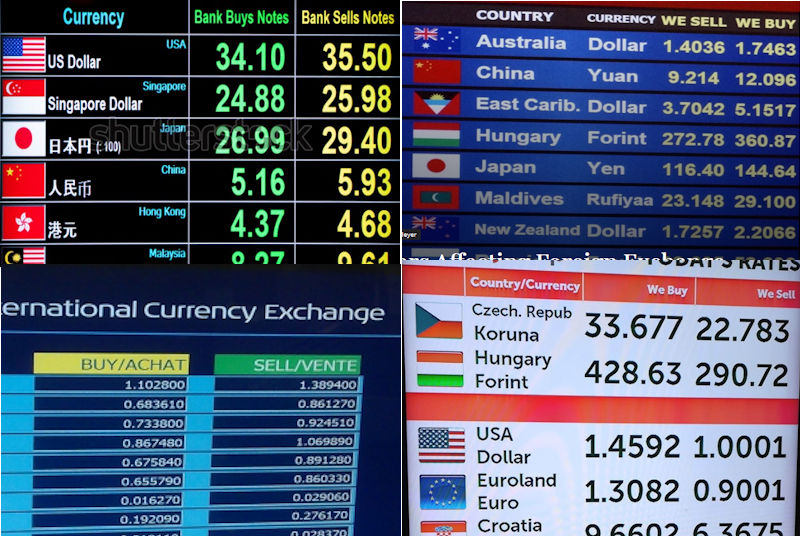Knowing the margins of exchange rates is crucial for anyone who has to manage international transactions, travelling or conducting business in countries that are not yours. Exchange rate margins are the variations between the purchase and selling prices of currency. They have a huge impact on transaction costs. The margins for exchange rates can vary greatly among providers. This can affect how much it costs to change money, or earn profits when investing. If you are aware of the subtleties of exchange rate margins, you'll be able make better decisions that can save you money and improve your financial results. Here are ten strategies to efficiently manage exchange rates margins.
1. Know what the exchange rate margin entails.
The spread or exchange rate margin is the difference between the amount an exchange rate margin for a currency is sold for and the price it could be bought for (ask). Understanding the idea of exchange rates is vital for all travelers, investors as well as businesses. The actual rate that you get will be based on the margin. A wider spread is an exchange rate that is higher, which allows you to make better financial decisions.
2. Compare margins between providers
Different financial institutions and currency exchange services offer different rates of exchange. Take the time to compare rates from a variety of providers like exchange kiosks, banks and online platforms. Websites like XE.com, OANDA and others can give you real-time insights regarding margins and rates. You can then choose the most appropriate choice for your transaction.
3. Understanding the influence of market forces on margin
- The margins of exchange rates may be affected by various aspects, including the market's volatility, economic indicators, or geopolitical events. For instance, a sudden recession or political instability can cause margins to increase due to increased risks. You will be able to make better choices about currency exchanges if you are aware of the market dynamics.
4. Currency exchange online
Online currency exchange platform often have lower fees and better rates than traditional exchange services and banks. Wise (formerly TransferWise), and copyright are two companies which offer real-time exchange rates, less charges, and more profit margins. These platforms will cut down your expenses for changing currencies when you travel or for doing business.
5. Timing Your Currency Exchange
The time you choose to exchange currencies can influence the margins. Exchange rates change throughout the day, based on the market demand and supply. Being aware of these fluctuations could aid you in determining the most favorable rates for exchange, and may increase your margins. Currency tracking tools can help you make these decisions.
6. Currency Hedging Strategies that Use Leverage
Investors and businesses can manage the exchange rate margins better by utilizing currency hedging. Hedging involves using financial instruments to lock in exchange rates for future transactions thus protecting against any adverse changes in the value of currencies. This approach can help to increase profits and decrease the effect of margins that are increasing in particular for firms that are involved in international trade.
7. Pay attention to economic indicators
Exchange rates can be affected and their margins affected by many economic indicators. These include interest rates and inflation rates. An increase in interest rates in a particular country may stimulate foreign investment. This will boost the currency of the country, and decrease its margin. These indicators will help you gain an understanding of currency movements. This will allow you to modify your strategy.
8. Be aware of local currency when traveling
Make sure to make your purchases in local currency, instead of your own. This can help you avoid unfavorable exchange rate margins that often come with dynamic currency conversion (DCC) options provided by retailers. The exchange rate tends to be more advantageous when you pay with local currency.
9. Beware of hidden costs
Be aware of any hidden fees imposed by the services that convert currencies. These can be transaction fees or service charges, as well as commissions, which could increase the amount you pay. To avoid unexpected costs, always be sure to read the fine print prior to making a change in currency.
10. Consult Financial Experts for Large Transactions
If you're managing large amounts of money or complex currency exchanges, consulting experts in finance or currency can offer valuable information. These professionals can guide you in understanding the exchange rate margins and provide strategies to reduce expenses. Their knowledge is particularly beneficial for businesses that engage in international trade or investors looking to optimize currency holdings.
These detailed tips will help you better manage the complex issues involved in the world of currency transactions. Understanding how to manage the margins of exchange can help you make better financial choices that align with your goals which will ultimately help you save money and enhancing your financial strategies. Have a look at the top her comment is here about AED to USD for site advice including usd to jpy, doller to rupee, exchange rate, dollar to yen, usd to php, pesos to dollars, 1 us dollar in indian rupees, pesos to us dollars, usd to pakistani rupee, usdthb and more.

Top 10 Suggestions For Rate And Exchange Limits For Currency
Limits on transactions are crucial for any financial activity whether it's traveling across the globe, managing investments or conducting business. They are the highest amount of cash you are able to be transferred within a specific time. Most of the time the limits are established by banks, payment platforms as well as financial institutions. Understanding transaction limits will aid you in maximizing your financial plan and avoid excessive costs or delays. Limitations on transactions could affect cash withdrawals and purchases made overseas. They can also affect cash flow management and payment processing for businesses. Investors should be aware of the limitations on transactions for buying and selling assets. The top 10 suggestions on how you can effectively manage transaction limits for your financial transactions are outlined below.
1. Be aware of your bank's transaction limits
Financial institutions and banks have their own restrictions for purchases, transfers, or withdrawals. It is recommended to know these limitations prior to traveling or engaging in large transactions. This information can assist you in managing your finances in a way that is efficient and prevent issues when trying to transfer funds or make purchases from abroad. The limits of your account are available on the website of your bank, or by contacting their customer support.
2. Prepare for Cash Withdrawals when you travel
While traveling, it is essential to plan your cash withdrawals in order to stay within the limitations of transactions for your bank. If you have a clear idea of the limit of your daily withdrawal, you can estimate how much cash you will require for your travels. You might want to consider making large withdrawals in one sitting in order to avoid running low on cash. Be aware of any foreign ATM charges that might be applicable. In addition, you should have a backup payment alternative in the event that you go over your withdrawal limit.
3. Utilize Multiple Payment Methods
It is not a good option to only rely on one method of payment particularly when there are limits on transactions. Utilize a mix of credit/debit and cash cards, along with mobile payment applications to be able to access your funds. This will help you to avoid exceeding the limits of transactions for one account. This also lets you be flexible when managing finances while traveling or conducting business.
4. Monitor Your Transactions Regularly
Monitoring your transactions can help keep track of your spending, and make sure that you are not exceeding the limit. You can track all your transactions using apps on mobile phones from various banks. These apps provide real-time information about your balance, including any fees. By monitoring your account, you can better manage your financial affairs.
5. Find out about the limits on international transactions
Check with your bank's guidelines on the limits of international transactions If you plan to take international withdrawals or purchases. Some banks have more stringent limits on international transactions. They may limit the possibility of accessing funds or make purchases from abroad. Knowing these restrictions allows you to make best choices and prevent interruptions during traveling.
6. Think about setting alerts for transactions
A lot of financial institutions, including banks, have alerts which will inform you when you're nearing the limits of transactions or if a transaction is made. You can manage your finances more effectively by setting up alerts. They will also prevent you from exceeding your limit. This feature is particularly beneficial to those who tend to lose track their spending when abroad.
7. Be aware of monthly and daily limitations
- Transaction limits can vary depending on the timeframe that include daily or monthly limits. As an example, your bank could allow you to withdraw a certain amount per day, while imposing a lower limit on monthly transactions. Knowing these timespans will assist you in planning your transactions effectively, ensuring that you can access funds when needed without exceeding your limits.
8. Talk to Your Bank About Temporary Limit Increases
Think about consulting with your bank to see what temporary limits that can be increased. A majority of banks will accommodate requests for greater limits provided you have an acceptable reason. Contact your bank ahead of time to discuss your needs. You may also need to provide any required documents.
Make sure you know the limitations of the payment platform.
Use of payment platforms, such as copyright or Venmo can also result in transactions being limited. Every platform has their own own policies regarding maximum transactions. These may vary depending on the account verification process and historical data. Before you make any transactions, check these limits to avoid disruptions or delays when processing your payment.
10. Learn More About the subject of investment Transaction Limits
Investors may be subject to transaction limits when buying or selling assets through brokerage accounts. These limits can impact your ability to execute quick trades, especially during times when markets are volatile. Be sure to familiarize yourself with the rules of your brokerage company regarding transaction limits. You may also want to think about using limit orders or alternative strategies to control your investments.
You can better manage your transactions by managing them effectively. This will allow you to better navigate the complexities that come with working, traveling or observing your investments. Knowing your bank's policies, planning for cash withdrawals, using various payment methods and keeping a watchful eye on your transaction activity will empower you to make smarter financial decisions. This will allow you to avoid unnecessary fees or interruptions as well enhance your overall financial plan. Take a look at the top rated forint for more recommendations including cdn to usd, usd to cop, dollar to php peso, usd to inr, yen to dollar, usd to euro exchange rate, usd to jpy, 1 us dollar in indian rupees, us dollar in indian rupees, usd to colombian peso and more.
